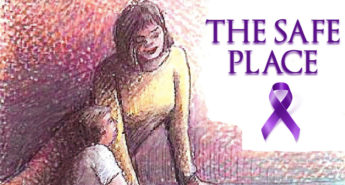 At The Safe Place, it is our job to work hard to prevent domestic violence from continuing. As part of that job, we like to educate the children in our communities in order to help them see that violence is never the answer. Children who grow up witnessing abuse are more likely to abuse their partners when they get older. Often, this is because it is the only way they have seen ‘love’, so they believe that is how they are supposed to treat someone they love. We, at The Safe Place, believe it is the best practice to start teaching the children from a young age about their feelings, emotions, and being kind. This is a great thing to do with all kids whether or not they have witnessed abuse.
At The Safe Place, it is our job to work hard to prevent domestic violence from continuing. As part of that job, we like to educate the children in our communities in order to help them see that violence is never the answer. Children who grow up witnessing abuse are more likely to abuse their partners when they get older. Often, this is because it is the only way they have seen ‘love’, so they believe that is how they are supposed to treat someone they love. We, at The Safe Place, believe it is the best practice to start teaching the children from a young age about their feelings, emotions, and being kind. This is a great thing to do with all kids whether or not they have witnessed abuse.
Some things you can do to help your child from a young age is to teach them about their emotions and feelings. Anger is one of the most important emotions to teach about. Children should know that anger is a natural human emotion. In our lives, we all experience anger. If children are taught how to handle and deal with feelings of anger at a young age, they will be better equipped when they are angry as adults. Let children know it will happen and teach them healthy ways to deal with anger. Maybe they need to step away for some alone time to think and cool down, take a walk, or several deep breaths. It is also important to teach them how to talk to people when they are angry, making sure they do not yell, curse, or continue to get angry when talking about what made them angry.
It is also important to talk about sadness. This is another emotion we feel a lot throughout our lives, but it is important to make children understand that sometimes life is beyond our control and sad or bad things may happen, but this is no reason to feel hopeless or overwhelmed. Teach children the proper stages of grieving (denial, anger, bargaining, depression, acceptance) and remind them that when they are feeling down to find the root of the sadness and try to fix that problem or to do things that make them happy in order to feel relief from the sadness.
It is also important to remember other important emotions such as happiness, excitement, nervousness, embarrassment, etc. All feelings and emotions are important, so please take some time to teach what each of these are and how to deal with them properly. In doing this, you are setting your child up for good things in the future. It teaches them not only how to deal with their own emotions, but also how to spot these emotions in other people so they can be better prepared for the emotions others bring to the table. A child who can deal with their feelings and emotions properly is a child who is prepared for their future, and most importantly adulthood.
Teaching these things is an important step in ending the cycle of domestic violence because even if the child witness abuse, they will be aware of what they are doing as an adult and understand that violence is never the answer and kindness is always key.
If you, or anyone you know, needs help with teaching children about feeling and emotions or is a victim of domestic violence, contact The Safe Place at 501-354-1884. You can also call the Crisis Line at 1-888-554-2501 or our Perryville location at 501-889-2030.




Leave a Reply